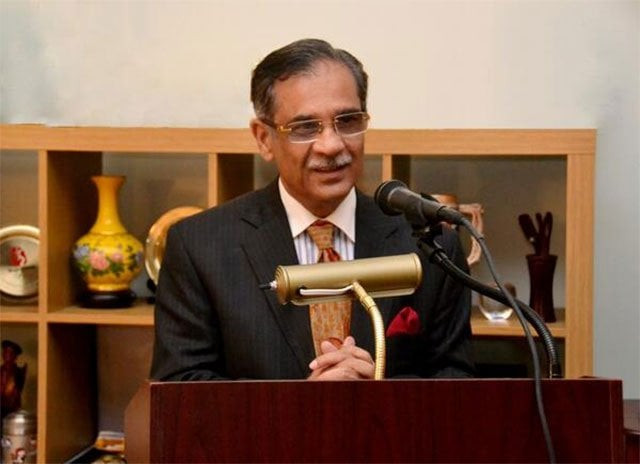Democracy directs us not to intervene in legislative matters: CJP Nisar
CJP stresses the importance of parliament running legislative matters

Chief Justice of Pakistan Mian Saqib Nisar. PHOTO: EXPRESS
“I firmly believe that the parliament is the supreme legislative body; hence legislation is not the prerogative of the judiciary and the responsibility to make the law more effective rests with the parliament,” said Justice Nisar, while addressing a meeting of the National Judicial [Policy-Making] Committee (NJPMC) at the Supreme Court’s Karachi Registry.
“However, the judiciary can strive to dispense justice by playing its role provided in the Constitution,” he added.
The meeting was attended by Federal Sharia Court Chief Justice Sheikh Najamul Hassan, chief justices of the provincial high courts – Justice Mansoor Ali Shah, Justice Ahmed Ali M Sheikh, Justice Yahya Afridi, Justice Mir Noor Meskanazai and Islamabad High Court Chief Justice Anwar Khan Kasi.
The apex court’s judges Justice Faisal Arab and Syed Sajjad Ali Shah as well as the Law and Justice Commission member Justice (retd) Mian Shakirullah Jan also attended the meeting on special invitation.
Justice Nisar, who is also the chairman of the NJPMC, said the courts are overburdened. In Punjab, a single judge has a caseload of more than 660 cases, he added. However, he continued, the judiciary is doing its best for dispensation of the justice and endeavouring to resolve issues of delays within its limited resources.
The CJP said the purpose of the meeting was to introduce reforms in the judicial sector for provision of speedy justice to the people of Pakistan as the commission examined reports highlighting reasons for delays in the disposal of civil and criminal cases.
The chief justice emphasised that the judicial officers should use all their expertise with full dedication to address the problem of backlog and delays in accordance with law. “Moreover, good speaking and legally correct decisions at the trial court level will also reduce the load upon appellate courts to a large extent,” he added.
He urged chief justices of the high courts and the Shariat Court to grasp the reasons for delays at the subordinate courts and advised that such reasons should be resolved by using available resources.
CJP all set to launch judicial reforms
The CJP emphasised that disputes of the general public could also be resolved in a timely and cost-efficient manner through recourse to alternate dispute resolution methodologies.
The committee also examined reports related to submission and approval of challan by the police and the prosecution within statutory periods which is the main cause of backlog and delays in the criminal cases.
It is underscored that investigating and prosecuting agencies should improve their standards. Moreover, the standard forensic laboratories should be set up throughout the country, it noted.
CJP Nisar stressed the need for upgrading the judicial academies for training of judges and publication of bench books for readily referring to basic principles of civil and criminal law. He also emphasised the need of formation of expert courts/special dedicated courts, which could adjudicate specific type of cases such as rent/family/ child care etc.
He said according to a decision of the SC the district judiciary should pass judgments within 30 days. The committee also examined the importance of the role of information technology in the legal arena.
Highlighting the need for using modern technology in the court processes, Justice Nisar said the Lahore High Court had adopted information technology in its working in a very useful manner which could be adopted by other courts as model which may be instrumental in providing relief to the general public.
He also put emphasis on the usefulness of bench-bar liaison.
The Law and Justice Commission of Pakistan Secretary Dr Raheem Awan presented reports highlighting the latest institution, pendency and disposal status of cases in the superior and district judiciary.
CJP Nisar said the SC had called a meeting of IGPs for improving process serving, and desired that secretary may propose suggestions for improvements in the process serving. “The National Judicial Automation Committee may submit proposals for improvement of automation of judiciary,” he added.
The secretary said the National Judicial Automation Committee’s meeting has already been called on January 27 and these directions will be considered in the meeting.
The chairman advised that the cases in which stay orders had been given should be decided within six months. He also desired that the high courts may submit proposals for effective mechanism regarding the process of execution of decrees which will be presented in the next meeting of NJPMC.
Similarly, proposals for devising a mechanism for quick disposal of rent and succession cases may be submitted by the high courts in the next NJPMC meeting which will be conducted within one month.
The chairman also directed the NJPMC secretary to convene a meeting of presiding officers of administrative tribunals/special courts posted throughout the country.
He said the meeting may be attended by chief justices of the high courts. The high courts may provide the LJCP Secretariat with performance reports of the aforesaid administrative tribunals/special courts for the last six months.
This was the first time male and female representative judges from all districts, provinces and Islamabad were invited to attend the NJPMC meeting to share the ideas and experience of district judiciary with this highest forum.



















COMMENTS
Comments are moderated and generally will be posted if they are on-topic and not abusive.
For more information, please see our Comments FAQ